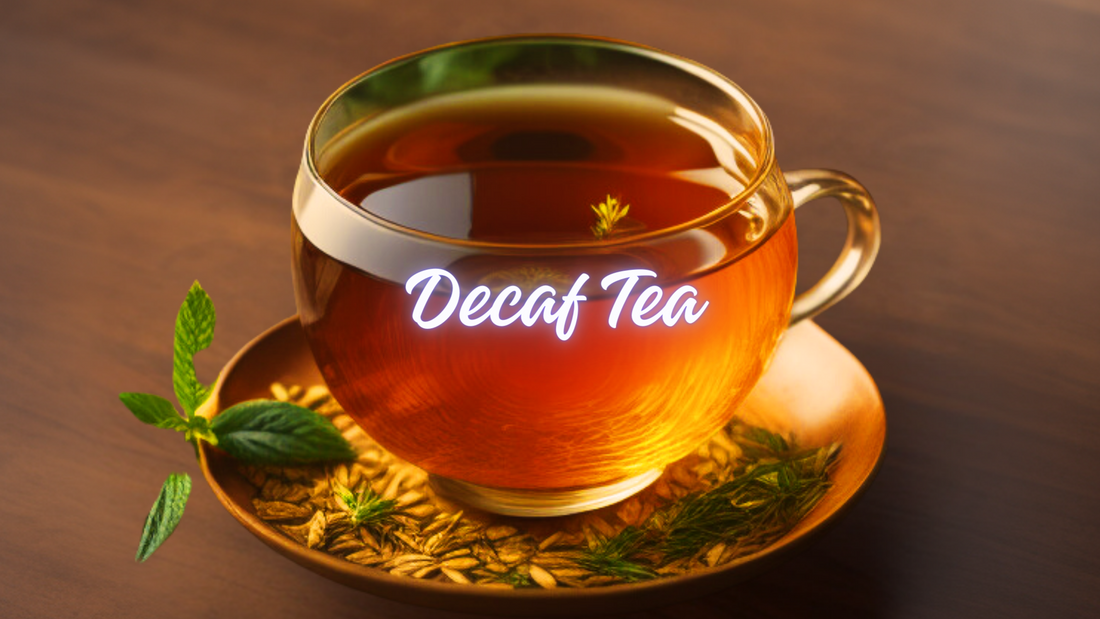Are you the type of person who craves a soothing cup of tea to kickstart your day or provide a moment of relaxation? As a tea lover, you may have come across various options, including decaffeinated tea. But is decaf tea as good as its caffeine counterpart? This burning question has sparked debates among tea and coffee enthusiasts for years.
In this blog, we will delve into the world of decaf tea and explore its benefits and potential drawbacks. By the end, you'll have a comprehensive understanding of whether decaf tea deserves a spot in your tea-drinking routine. So brew yourself a cup of your favorite tea and get ready for an enlightening conversation!
Understanding Decaffeinated Tea
What is Decaffeinated Tea?
Decaffeinated tea, also known as decaf tea, is tea that has undergone a process to remove most of the caffeine. The term "decaffeinated" indicates that the tea leaves have had at least 97.5% of the caffeine removed. Decaf tea has less caffeine than regular tea, but there might still be a small amount of caffeine in it.
How is Decaf Tea Made?
There are several methods used to decaffeinate tea, each with its process and effects on flavor and health benefits. The most common methods include:
- Chemical Solvents: This method involves using chemicals such as dichloromethane (methylene chloride) or ethyl acetate to extract caffeine from the tea leaves. These solvents bind to the caffeine molecules, leaving behind the flavor compounds. While this method is effective, there are concerns about the safety of the chemicals used.
- Carbon Dioxide: In the carbon dioxide (CO2) method, tea leaves are exposed to high-pressure liquid carbon dioxide, which acts as a solvent to remove caffeine. This method is considered more natural and preserves the flavor profile of the tea.
- Water Processing: Also known as the Swiss Water method, this technique involves soaking the tea leaves in hot water to extract caffeine. The water is then passed through activated charcoal filters to remove the caffeine, and the flavor-rich water is reintroduced to the tea leaves to reabsorb the flavors.
- Triglyceride Method: This non-chemical method involves soaking green coffee beans in hot water to draw out the caffeine. The beans are then transferred to another container where they are soaked in coffee oils obtained from spent coffee grounds. The triglycerides in the oils remove the caffeine while preserving the flavor elements.
It's important to note that tea manufacturers are not required to disclose the decaffeination method used, so it can be challenging to determine which method was employed for a specific decaf tea.

The Benefits of Decaf Tea
Decaf tea offers several advantages for those who want to reduce their caffeine intake or avoid its stimulating effects. Here are some potential benefits:
- Reduced Caffeine Intake: Decaf tea allows you to enjoy the comforting ritual of tea without the jitters or sleep disturbances associated with caffeine. It's a great option for individuals who are sensitive to caffeine or those who want to limit their overall caffeine consumption.
- Flexible Anytime Enjoyment: With decaf tea, you can indulge in a cup at any time of the day, including evenings or before bedtime, without worrying about caffeine-induced sleep disruptions.
- Variety of Flavors: Decaf tea comes in a wide range of flavors and blends, ensuring that you can find a decaffeinated option that suits your taste preferences. From floral blends to invigorating mints, there's a decaf tea for every palate.

Drawbacks of Non caffeinated
While non caffeinated tea offers benefits, there are a few drawbacks to consider:
- Trace Amounts of Caffeine: Despite the decaffeination process, decaf tea may still contain trace amounts of caffeine. The caffeine content can vary depending on the decaffeination method used and the quality standards of the manufacturer. It's essential to be aware of your caffeine sensitivity and consult with a healthcare professional if necessary.
- Flavor Alterations: The decaffeination process can impact the flavor profile of the tea. Some methods, such as the use of chemical solvents, may result in a slight alteration of taste or even a chemical aftertaste. However, methods like the carbon dioxide process are known for preserving the flavor characteristics of the tea.
- Potential Loss of Health Benefits: While tea is renowned for its health benefits, the decaffeination process can lead to a reduction in certain beneficial compounds. Polyphenols and antioxidants, which are associated with various health benefits, may be diminished during the decaffeination process. However, the extent of this reduction can vary depending on the method used.
The Final Verdict: Decaf Tea and Your Health
organic decaffeinated green tea can be a suitable choice for individuals who are sensitive to caffeine or want to limit their caffeine intake. It allows you to enjoy the ritual and flavors of tea without the stimulating effects of caffeine. However, it's important to note that decaf tea may still contain trace amounts of caffeine, which can affect those with extreme caffeine sensitivity.
When it comes to the health benefits of tea, there is some reduction in certain compounds like polyphenols and antioxidants. However, the extent of this reduction can vary depending on the decaffeination method used. Methods like carbon dioxide decaffeination are generally considered to preserve more of the tea's health benefits compared to chemical solvent methods.
To ensure the highest quality and potential health benefits, look for naturally decaf tea that is organically produced and processed using natural methods such as carbon dioxide or water processing. These methods are generally safer and help retain the flavor and health benefits of the tea leaves.
In conclusion, decaf tea can be a healthy and enjoyable alternative for those looking to reduce their caffeine intake. It's important to choose decaf teas that have undergone a safe and natural decaffeination process to ensure the preservation of flavor and potential health benefits. So go ahead, sip on that cup of decaf tea and savor the soothing experience without worrying about caffeine's effects.
Additional Information:
If you're looking for specific decaf tea options, Key west Coffee and Tea offers a range of decaf organic green tea products. You can consider Lipton Green Tea. Lipton Decaf Green Tea bags provide a flavorful and refreshing option for tea lovers who prefer a milder flavor and lower caffeine content.
Before changing your tea-drinking routine, talk to a healthcare professional about any health concerns or dietary restrictions you have. Enjoy the comforting and relaxing moments that decaf tea brings to your day while taking care of your overall well-being.

